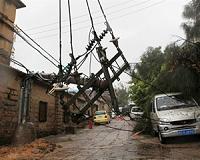| . |  |
. |
San Jose (AFP) Sept 24, 2010 A fast-moving Tropical Storm Matthew made landfall in Central America Friday, threatening to bring new destruction to a region already suffering the consequences of an abnormally fierce rainy season. At 2100 GMT, Matthew's center was located inland over northeastern Nicaragua, heading west over Honduras, the Miami-based National Hurricane Center reported. The storm was moving at nearly 15 miles (24 kilometers) per hour, packing winds of 45 miles (75 kilometers) per hour. "This motion is expected to continue during the next day or two, bringing the tropical cyclone across Honduras," the NHC said. The storm is expected to lose strength and lose its tropical storm status by Sunday. However, even a weakened Matthew could be dangerous, the experts warned. The storm is expected to dump between six and 10 inches of rain over parts of Nicaragua and Honduras, with up to 15 inches possible in isolated areas. "These rainfall totals may produce life-threatening flash floods and mud slides," the NHC said. Central America is in the midst of one of the most intense rainy seasons in the last 60 years, with flooding and landslides that have killed more than 300 people and caused serious damage in recent months.
earlier related report Central America is in the midst of one of the most intense rainy seasons in the last 60 years, with flooding and landslides that have killed more than 300 people and caused serious damage in recent months. Forecasters said Matthew was speeding up and was now expected to make landfall near the Nicaragua-Honduras border on Friday afternoon, before moving over northern Honduras Friday evening into Saturday. At 1500 GMT, the center of Matthew was about 80 miles (125 kilometers) east-southeast of Cabo Gracias a Dios on the border between Nicaragua and Honduras, packing sustained winds of 50 miles (85 kilometers) per hour, the Miami-based National Hurricane Center said. "Matthew heading toward Central America in a hurry," the center headlined its latest bulletin, warning the storm system could bring heavy rains, landslides and dangerously high waves. "Some slight strengthening could occur before landfall but thereafter weakening is forecast," the center said. Matthew is expected to dump between six and 10 inches of rain over parts of Nicaragua and Honduras, with up to 15 inches possible in isolated areas. "These rainfall totals may produce life-threatening flash floods and mud slides," the NHC said. As the outer bands of rain began to lash parts of Nicaragua and Honduras, both countries were on high alert, ordering residents to be vigilant and take necessary precautions. Nicaraguan President Daniel Ortega ordered coastal evacuations ahead of Matthew's storm surge as the NHC warned the storm would bring "large and dangerous waves." Panama also put hundreds of miles (kilometers) of its northern shores on storm alert, despite Matthew travelling away from its territory, while the government of Belize placed its entire coastline -- set for a direct landfall -- on a tropical storm watch. On its forecast track, the center of Matthew will make landfall just south of Nicaragua's border with Honduras, before tracking northwest over the border and heading inland. It is expected to briefly cross water again, striking southern Belize by Saturday evening, before crossing into Guatemala by Sunday, and continuing north into Mexico's Yucatan peninsula. Since the arrival of Tropical Storm Agatha in late May, heavy rain has swamped Guatemala, Nicaragua, Honduras and El Salvador. Guatemala has already suffered through waves of heavy rains that let loose deadly landslides. The country's President Alvaro Colom has declared a "state of national emergency" due to the heavy rain and flooding, which has killed at least 36 people, left some 40 people missing, forced the evacuation of around 11,500 and caused some 1.5 billion dollars in damage. In Mexico this month at least 14 people died from Hurricane Karl-related flooding or landslides in Veracruz, where authorities said half a million people have been affected. Veracruz governor Fidel Herrera said Thursday that the storm system left some 3.9 billion dollars in damages in its wake.
Share This Article With Planet Earth
Related Links Bringing Order To A World Of Disasters When the Earth Quakes A world of storm and tempest
 Typhoon Fanapi kills 54 in China: state media
Typhoon Fanapi kills 54 in China: state mediaBeijing (AFP) Sept 23, 2010 Typhoon Fanapi, one of the strongest storms to hit China in years, has left 54 people dead and 42 missing in flooding and landslides in the south of the country, state media said Thursday. Xinhua news agency said 79,000 people had been evacuated due to Fanapi, which hit China on Monday a day after raking Taiwan with heavy rains, killing two people and leaving more than 100 injured on the isl ... read more |
|
| The content herein, unless otherwise known to be public domain, are Copyright 1995-2010 - SpaceDaily. AFP and UPI Wire Stories are copyright Agence France-Presse and United Press International. ESA Portal Reports are copyright European Space Agency. All NASA sourced material is public domain. Additional copyrights may apply in whole or part to other bona fide parties. Advertising does not imply endorsement,agreement or approval of any opinions, statements or information provided by SpaceDaily on any Web page published or hosted by SpaceDaily. Privacy Statement |